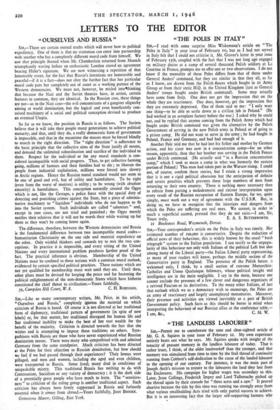"THE POLES IN ITALY"
Snt,—I read with some surprise Miss Wiskemann's article on "The Poles in Italy" in your issue of February 1st, but as I had not served in Italy felt that I could not criticise it Mr. Graves's letter in your issue of February 15th, coupled with the fact that I was not long ago engaged on military duties at a camp of several thousand Polish soldiers at La Courtine in France, prompts me to offer one or two observations. I do not know if the mentality of these Poles differs from that of those under General Anders' conunand, but they are similar in that they all, as far as I know, are drawn from the Polish forces which fought in 21 Army Group or from their static H.Q. in the United Kingdom (just as General Anders' troops fought under British command). Some may actually have come from Italy. One does not get the impression that on the whole they are reactionary. One does, however, get the impression that they are extremely depressed. One of them said to me: "I only want one thing—to be able to settle down to a civilian job in Poland." (He had worked in an aeroplane factory before the war.) I asked why he could not, and he replied that anyone coming from the Polish Army which had fought under British command was given the alternative by the Polish Government of serving in the new Polish army in Poland or of going to a prison camp. He did not want to serve in the army ; he had fought in Poland, France and Germany, and had had enough of it.
Another Pole told me that he had lost his father and mother by German action, and his sister was now in a concentration camp—for no other reason, apparently, than that her brother was serving in the Polish Forces under British command. (He actually said "in a Russian concentration camp," which I took to mean a camp in what was formerly the eastern portion of Poland.) This man had taken part in the Warsaw rising. I could not, of course, confirm these stories, but I retain a strong impression that it is not a rigid political obsession but the anticipation of definite and severe penalties which prevents these large numbers of men from returning to their own country. There is nothing more necessary than to refrain from putting a melodramatic and sinister interpretation upon every result of the Russian occupation of Eastern Europe, for we, quite simply, must work out a way of agreement with the U.S.S.R. But, in doing so, we have to recognise that the injustices and dangers from which the Poles are suffering are real ones. We cannot, in order to' reach a superficial accord, pretend that they do not exist.—I am, Sir,


























 Previous page
Previous page